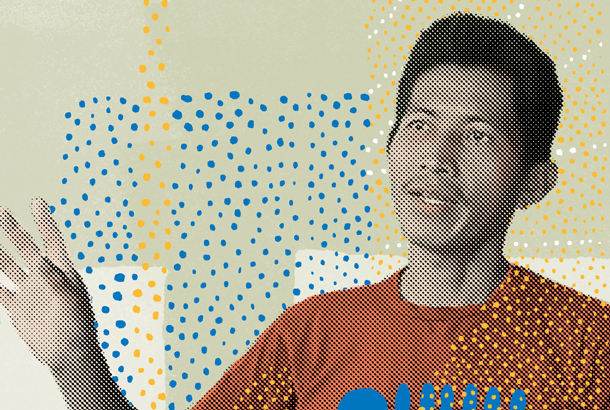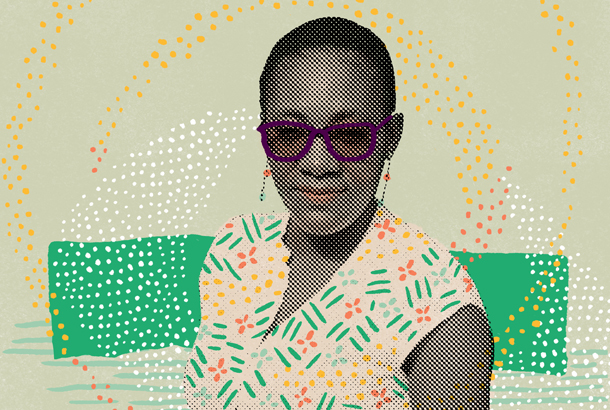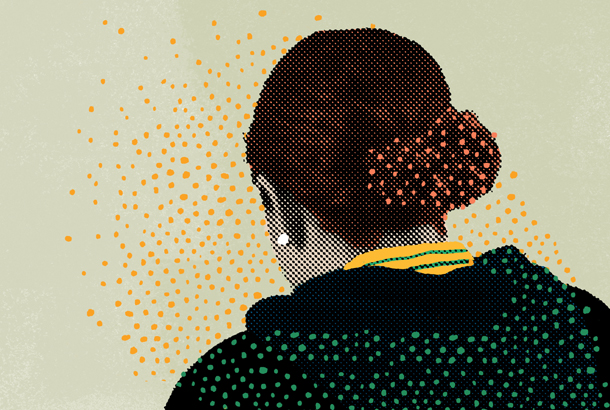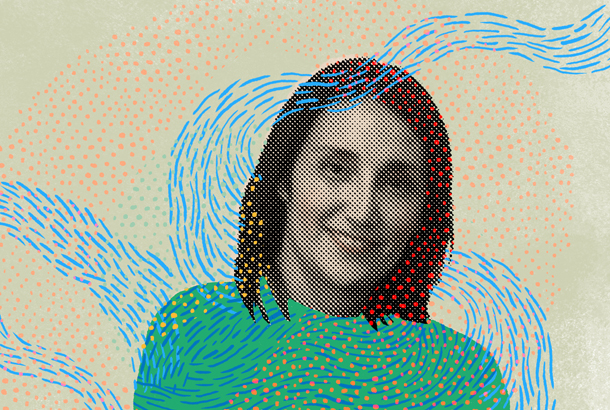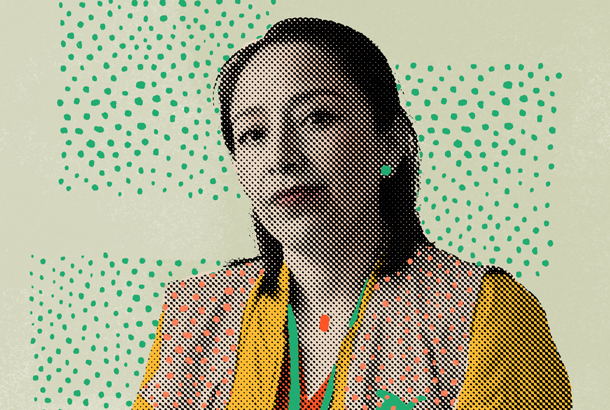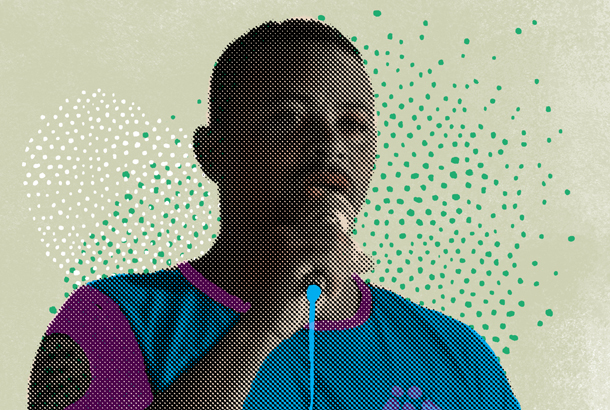Profiles from Latin American and Caribbean Countries
Survivors and practitioners
From victim of forced labour to human rights defender
The Consejo Nacional de Desplazados de Guatemala (CONDEG) (Guatemala)
*Simon, survivor (illustration by Vérane Cottin, photograph by CONDEG)
*Simon spent all his life in a small town on the territory of the maya Q’eqchi people in Alta Verapaz, Guatemala. In 2015, a company came to the region and imposed a palm oil monoculture on lands that belonged to the communities and were used to grow food. Soon, the Q’eqchi people had to start working for this company to make a living. But they faced difficult working conditions, no minimum salary, and had a lack of alternative options.
“I worked 3 years without a contract and 3 years with one.” says Simon. After time, the workers took action, and Simon was elected with others to confront a representative of the company. Dozens of people, including all of the elected representatives, were quickly fired while more than 800 people kept working without contracts in slave-like conditions.
After confronting the company in Raxhuhá, Simon and the other representatives were falsely accused of various offenses by the company. “Since they knew that we had caused trouble for them in the previous years, they invented a lie about us. We still suffer the consequences of this lie.” Simon spent several weeks in prison.
This cycle of exploitation and criminalization is not isolated. Speaking at the United Nations Forum on Business and Human Rights in 2019, Executive Committee member of the Consejo Nacional de Desplazados de Guatemala (CONDEG) Santos Natalio Chic Us described a pattern of private companies seizing lands from indigenous farmers to expand their palm oil production facilities. Workers employed by these companies received a salary below the minimum wage and no benefits. “When a worker complains, he is fired unfairly and is not paid compensation. This treatment clearly amounts to exploitation and slavery,” said Chic Us.
The indigenous population is particularly vulnerable to situations of labor exploitation and forced labor, according to the International Labour Organization (ILO). In 2022, the United Nations Committee on Economic, Social and Cultural Rights expressed concerns about assaults, threats and reprisals committed against human rights defenders, including indigenous leaders, and that criminal law is improperly used to persecute these individuals.
Fighting the criminalization of victims
Since the time of Simon’s arrest, CONDEG provided legal advice and representation to Simon and six other human rights defenders. On 11 June 2021, the Court ruled in favour of all seven human rights defenders, acknowledging that they had indeed been victims of criminalization for simply standing up against forced labour and for their rights in the palm plantations.
The financial support of the United Nations Voluntary Trust Fund on Contemporary Forms of Slavery was crucial in enabling CONDEG to provide support in this case until the final decision. It allowed CONDEG to pay for the penal lawyer who represented the victims in court and to provide additional support throughout the judicial process.
For years, the organization has supported victims by issuing complaints about their mistreatment and abusive working conditions in the palm oil industry and raising awareness about this situation. They train workers about their rights and represent them in legal proceedings, with a focus on human rights defenders who wrongly face criminal charges, such as Simon.
Despite his experience in prison, Simon decided to keep representing workers and fighting for the rights of his community. “I think that defending human rights is very important. It is legitimate, we must defend our rights, as indigenous peoples, as agricultural workers, no matter where we are working,” he says.
The Consejo Nacional de Desplazados de Guatemala (CONDEG) received its first grant from the United Nations Voluntary Trust Fund on Contemporary Forms of Slavery in 2016.
Ending Domestic Slavery in Haiti
Restavek Freedom (Haiti)
Jasmithe Douyon, Staff member (illustration by Vérane Cottin, photograph by Restavek Freedom)
“I thought, maybe I’ll see cars and have new clothes and meet new people and go to school,” remembered Madeline, one of Restavek Freedom Foundation’s former beneficiaries. However, the woman Madeline was sent to work for, who became known as her “host aunt”, had different plans for her. She expected Madeline to fetch water, cook, do the household laundry, clean and care for the host aunt’s own children.
In the Haitian Creole language, “restavek” means “to stay with,” but in practice it alludes to a system of child domestic servitude. Parents who are unable to provide for their children send them to a better-off family in the city, hoping that in return for domestic help their child will be fed, educated and cared for. However, most children rarely attend school and are exploited for heavy and excessive labour, in addition to being subjected to verbal, physical and sexual abuse.
The Restavek Freedom Foundation is a charity organization at work in Haiti to stop child slavery and child trafficking. In addition to their advocacy activities, Restavek Freedom runs two transitional homes. Each of them can house 24 children, providing shelter, education, and trauma-informed care to help beneficiaries heal in a loving, family atmosphere.
With financial support from the United Nations Voluntary Trust Fund on Contemporary Forms of Slavery, Restavek Freedom supplies the child with all the items they need to attend school, as well as a caseworker who meets with them weekly to ensure they are receiving humane treatment and going to school.
According to the organization, approximately one in four children in Haiti do not live with their biological parents. Of these, an estimated 286,000 children under age 15 are in domestic servitude. Many of these children live in conditions which have been described as a contemporary form of slavery by the United Nations Special Rapporteur on contemporary forms of slavery.
"Just the fact that the people they live with know someone is looking after these children makes a difference in the way they are treated," said Restavek Freedom Executive Director Joan Conn.
Changing the Culture Around Child Slavery
The Restavek Freedom Foundation also created “activity hubs” in all the regions of Haiti to provide restavek children with economic and educational opportunities near their home.
To further protect them during the summer months when they face increased working hours and abuse in the absence of school, Restavek Freedom runs a summer camp. It provides children with respite from their long days with crafts, playtime, schooling, tutoring and meals.
When possible, biological children from their host families are invited to attend alongside the restavek children. For some of the restavek children, like Layla*, attending the summer camp with her host aunt’s daughter, Darline, changed everything.
“A few weeks after camp I didn’t have time to do the dishes before school, and my ‘aunty’ was going to beat me. But Darline told her not to hit me, and that she would help me do the dishes instead,” Leyla said. “My aunty started to get angry, but Darline told her that she learned about the rights and duties of all children at Summer Camp, and that all children are equal. Everything started to change and get better…after that.”
Conn explains, “we realized in order to impact this system in Haiti that we couldn't just put kids in school. We had to sensitize the entire country on this issue… to really change the hearts and minds of the Haitian people regarding these children.”
Restavek Freedom received its first grant from the United Nations Voluntary Trust Fund on Contemporary Forms of Slavery in 2011.
A Dignified Life After Trafficking
Coalition against Trafficking in Women in Latin America and the Caribbean (CATW-LAC) - Mexico
Guadalupe, Survivor (illustration by Vérane Cottin, photograph by CATW-LAC)
Guadalupe is a young woman from Central America. In 2008, she met an older woman who she came to trust. However, the woman lied to Guadalupe and handed her over to traffickers who took her to Mexico, using false documents. She was then forced to stay in Nuevo Laredo, a city at the border between the United States and Mexico. “They forced me to work in a table dance, where I had to dance and prostitute myself. (…) I was constantly monitored, and I was working 14 hours a day,” she says.
Unfortunately, such cases are common. Mexico is considered a country of origin, transit and destination for trafficking. According to the United Nations Office on Drugs and Crimes (UNODC), more than 70% of the victims of this practice in the Americas are trafficked for the purpose of sexual exploitation - a much higher percentage than in other regions of the world.
This high rate is caused by deep-seated sexism and a lack of political will, according to Teresa C. Ulloa Ziáurriz, the Executive Director of the Coalition Against Trafficking in Women in Latin America and the Caribbean (CATW-LAC). “When we try to break the stereotypes that reduce women and girls to commodities that can be bought, sold, rented, paid for, or taken by means of deception or force, […] we come up again and again against a judicial power that in Mexico continues to be the guarantor of the rancid values of the patriarchy,” she said.
Confronting the Red Alert
CAT-WLAC is a non-profit civil organization with extensive experience addressing contemporary forms of slavery, including all the crimes related to trafficking in women and girls. Over the years, it has developed expertise in responding to sexual exploitation and gender-based violence.
With the support of the United Nations Voluntary Trust Fund on Contemporary Forms of Slavery, the organization developed and strengthened a programme called the Red Alert System. It focuses on the prevention, prosecution, sanction and eradication of trafficking while empowering survivors and their families. Medical assistance, humanitarian support, transitional shelter, education, vocational training and legal representation are among the key services provided in the programme. Between 2006 and 2016, the organization’s work led to the reunification of families, location and rescue of more than 1,300 victims.
When she escaped, Guadalupe was quickly brought to their office where she met Ulloa. There, she received comprehensive livelihood assistance. She wanted to obtain justice, so CATW-LAC provided her with legal representation. “I am very thankful to the Coalition for taking care of my legal defense and attending all my needs,” says Guadalupe.
Ulloa stresses the importance of fighting for legal remedies in spite of obstacles. CATW-LAC participated in several cases leading to convictions through the years. “With the legal assistance that we offer, victims are able to seek and obtain restitution for the human rights violations they suffered,” reads one of their reports on the Red Alert System. “Our commitment and mission is to enable them to recover, by rebuilding their lives, and restoring their hope, their smiles, and their freedom.”
The Coalition against Trafficking in Women in Latin America and the Caribbean (CAT-WLAC) received its first grant from the United Nations Voluntary Trust Fund on Contemporary Forms of Slavery in 2014.
The Strength to Move Forward
Corporación ONG Raíces (Chile)
Loreto Caro, Executive Director (illustration by Vérane Cottin, photograph by Corporación ONG Raíces)
Held in domestic servitude, Elena* was abused and exploited by the family where she worked, until she became pregnant and decided to flee.
Then, she found Raíces. “They were always there to support me. They never forced me to do anything. They gave me the strength to move forward,” says Elena.
Raíces is an organization which stands at the forefront of the fight against the commercial sexual exploitation of children in Chile. For more than 20 years, the organization has specialized in research, advocacy, awareness-raising and projects facilitating the rehabilitation of survivors of sexual violence and exploitation.
“They have always told me that if I needed something, I just had to speak, to say it… And I never feared to ask for things because in the end, they were like a family for me,” says Elena. She received both vocational training and medical assistance for her and her son, thanks to Raíces.
With financial support from the United Nations Voluntary Trust Fund on Contemporary Forms of Slavery, Raíces also provides psychosocial support to survivors, investing in children’s abilities to rebuild their lives with affection, creativity and confidence. Currently, Raíces is running three shelters serving about 140 survivors. All of the shelters combine therapeutic and recreational approaches, including a theater company run by survivors.
“It is difficult to be able to express in words how my vision of life changed by realizing how violent and perverse human beings are,” said Loreto Caro Sabini, Raíces’ Executive Director.
“I have grown immensely and my heart has been filled with light working with children and adolescents who are survivors… They motivate me day-by-day to continue fighting and making these violations visible so this does not continue to happen.”
Addressing Persisting Problems
Raíces carried out its first investigation into commercial sexual exploitation in 1996 with female victims and adolescent mothers who had survived Chile’s initial crackdown down on “coyotes”, or traffickers. Since then, the NGO has worked on commercial sexual exploitation of boys, girls and adolescents, and gained strength in 2001 when the Ministry of Justice and the National Service for Minors (Sename) requested the development of a pilot plan to repair the damage to child victims of sexual exploitation.
Still, the problem persists. Chile is a source, transit and destination country for child trafficking for sexual exploitation. Raíces participates in trials as expert witnesses and has succeeded in increasing sentences for child sexual offenders. In 2018, the country set a new protocol for prosecutors and attorney advisors for the investigation of crimes related to child trafficking for sexual exploitation. The NGO also helped create a new software system to track the complicity of government officials in trafficking crimes.
“The voices of survivors lead the way against human trafficking,” Caro Sabini said. “Learning from them, we follow their example to eradicate it.”
Corporación ONG Raíces received its first grant from the United Nations Voluntary Trust Fund on Contemporary Forms of Slavery in 2016.
A Life Project Free of Violence
Fundación Alas de Colibrí (Ecuador)
Verónica Supliguicha Cárdenas, Project coordinator (illustration by Vérane Cottin, photograph by Alas de Colibri)
In July 2022, the Ecuadorian National Assembly began the first debate on the draft Law Against Trafficking in Persons and Smuggling of Migrants, which aims to combat trafficking and aid victims. Actions include prevention and promotion of rights, protection, assistance, investigation, and prosecution, as well as reparations for victims.
The government had a lot riding on the bill. Since about 2000, Ecuador has reported approximately 5,000 annual cases of child kidnappings. In 2015, an independent expert from the United Nations Committee on the Elimination of Discrimination against Women said that Ecuador was still a country of origin, transit and destination for the trafficking of women and girls, mostly for the purpose of labour and sexual exploitation.
The Trafficking Act might not have even made it to the Ecuadorian National Assembly without the advocacy of Fundación Alas de Colibrí. One of its founders, Verónica Supliguicha Cárdenas, is a clinical psychologist and human rights specialist who focuses on the gender dimension of trafficking. As a member of the Quito anti-trafficking network, the organization has been coordinating an annual commemorative event since 2016 called “Vigil for survivors of human trafficking”.
A Rights-Based Approach to Rehabilitation
With financial support from the United Nations Voluntary Trust Fund on Contemporary Forms of Slavery, the organization runs a shelter called the “Protection Nest” for girls and young women aged between 12 and 17 years old who have been trafficked. There, it carries out workshops and job training suited to the specific needs of these girls. It also provides psychological, educational, social and legal assistance, and organizes recreational, leisure and cultural activities to reinstate beneficiaries’ social rights, and to promote the improvement of intrafamily relationships.
Alexandra*, a 16-year old from Empalme, Guayas, arrived at Fundación Alas de Colibrí in 2021. She said that the staff at the Nest helped her broaden her horizons. “I have learned to see things from different ways…I like the educational workshops because I learn about more topics and strengthen my academics,” Alexandra said.
“I have also learned to eat what I did not like before, because I now know that it is nutritious, and appreciate and take advantage of the fact that I have food every day.”
Cárdenas said the Fundación Alas de Colibrí takes a rights-based approach to its rehabilitation. “This means that all the care and service we provide is focused on the person,” she said. “We start from their abilities, their capacities, but we also identify their needs. Based on all of it, we will build a life project free of violence.”
While Ecuador’s anti-trafficking bill still has many milestones to pass — and the budget gets smaller every year —, Fundación Alas de Colibrí still hopes it will eventually come into law. In the meantime, they will be there to cover the shortfalls.
Fundación Alas de Colibrí received its first grant from the United Nations Voluntary Trust Fund on Contemporary Forms of Slavery in 2021.
A Fight to End Cycles of Slavery
The Carmen Bascarán Center for the Defense of Life and Human Rights (Brazil)
Gildásio Meireles, Citizenship Agent (illustration by Vérane Cottin, photograph by CDVDH/CB)
José was lured to a pineapple plantation in Pará, Brazil, which neighbours his home state of Maranhão, with an advance payment and the promise of employment. This advance is the only payment José would receive for the four months he worked on the plantation.
José spent 16 weeks working from 6 AM to 6 PM under hazardous conditions, breathing in toxic pesticides, agro-chemicals and smoke. On the plantation, he and ten other men lived in decrepit barracks, without bathrooms or running water, and were fed a small portion of rice, beans and meat for dinner, and only coffee in the morning. None of the men received payment.
It is estimated that 39% of all slave labor in the country originates from the state of Maranhão, in northeast Brazil, where José is from. There are numerous compounding effects that have left the population in this state more vulnerable to slavery, namely illiteracy, lack of economic opportunities and the remoteness of the area.
The Carmen Bascarán Center for the Defense of Life and Human Rights (CDVDH/CB) was able to help José and the other men leave the pineapple plantation, as it has done for many others throughout its 25 year existence. After CDVDH filed a complaint, the Rescue Mobile Team of the Ministry of Labour managed to rescue José. Once he was removed from the farm, CDVDH assisted him with his case at the Ministry of Labour, channeled funds to compensate him for his work and supported his return home.
After being rescued from slave labour on a farm in Maranhão, Gildásio Meireles made the transition from victim to advocate with the support of CDVDH/CB. .
"Slave labour tries to tear away people's humanity, at CDVDH/CB I learned about my rights and how to assert them,” Meireles says. “Today I work as a Citizenship Agent, alerting other workers about slavery on farms and helping my community to break the cycles of slavery."
Following his work, Meireles was recognized with the Magno Cruz Human Rights Award from the government of the State, in the Human Rights Defender category.
Reducing Key Vulnerabilities
The CDVDH/CB was founded in 1996 in Açailândia, Maranhão, with the aim of standing up against the human rights violations identified in the region. The organization carries out a range of activities, providing legal advice and social assistance while also increasing social and political awareness.
Mariana de la Fuente, a member of CDVDH/CB says that "through its work, the CDVDH/CB contributes to reducing key vulnerabilities in the fight against contemporary slavery and other human rights violations in the State of Maranhão. It acts strategically to prevent violations of rights, as well as guaranteeing access to justice for the victims.”
With financial support from the United Nations Voluntary Trust Fund on Contemporary Forms of Slavery, CDVDH/CB will continue to provide access to social and legal mechanisms of justice for victims of slave labor.
The Carmen Bascarán Center for the Defense of Life and Human Rights received its first grant from the United Nations Voluntary Trust Fund on Contemporary Forms of Slavery in 2011.
